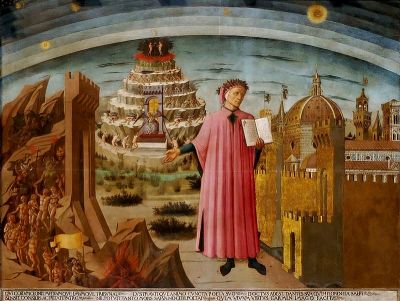L'articolo descrive la meravigliosa vita di Dante Alighieri. Nelle sue opere Dante aveva dato il senso ad un amore puro, semplice e gentile. Ad esempio, nella sua opera La Vita Nuova, Dante descrisse un amore divino per Beatrice, la ragazza che conobbe quando lui aveva 8 anni. Un'altra ispirazione per le sue opere fu la divisione che c’era a Firenze in quel tempo tra due famiglie, i guelfi ed i ghibellini. Dante ha indicato queste turbolente vicissitudini nella sua opera ‘La Divina Commedia’. Questo lavoro narra anche di temi come l'amore e la religione. Dante è a tutt’oggi uno scrittore rispettato e adorato. Le sue opere sono esempi perfetti della scrittura poetica e descrittiva.
“There is Dante, and then all others,” so said Eric Auerbach, acclaimed 20th-century German philologist and literary scholar. Auerbach is not alone in his praise of the Florentine poet. Michael Dirda, Fulbright Fellow and Pulitzer Prize winner, wrote, “one important writer after another argues strongly for Dante – even above Shakespeare – as the central figure of European literature, the linchpin of the great classical and Christian tradition of learning and culture.”
While Dante has fallen in and out of favor with literary critics over the centuries, for the Italian people, he has always loomed as a colossus on the Italian cultural landscape. Dante’s dream of a united and independent Italy inspired the people of the Risorgimento to free themselves from foreign and papal chains. Although never completed, Mussolini planned an enormous monument to Dante as part of his uber-nationalism. Sadly when someone becomes an icon, they cease to be human. The very real hurts and hopes, passions and pains, are lost. So, who was Dante?
When we look at the raw facts of Dante’s life, he seems as unlikely a hero as Bilbo Baggins. Born in 1265, he was bapized Durante di Alighiero degli Aligheiri. Although Dante claimed to be a descendant of the Romans, who he said were holy, compassionate, and glorious, there is nothing that proves his heritage to be anything more than that of an average Florentine’s. He died an exile with no home, no city, no power, surviving on the kindness of others. Between those two events, love and war shaped him, giving him one great strength, his words.
The first of these, love, touched Dante at the age of nine when he saw Beatrice Partinari, who was eight. In his first great work, “La Vita Nuovo”, Dante says that love happened to him without expecting it. This love directed his efforts as a poet. Before Dante, love, as many see it today, was filled with the allure of erotic passion, seeking some physical expression, overriding reason in blind abandonment. In “La Vita Nuovo”, however, Dante did not describe his love for Beatrice in this way. Dante’s love was spiritual, not sensual, not a distraction from God but drawing us closer to the divine, elevating the soul. He gave us this new and more correct perspective on the very essence of love.
War was the second force that shaped Dante’s life and, ultimately, his philosophy. At the time of his birth, Florence was divided into two camps; the Guelphs, who supported the Papacy, and The Ghibellines, who supported the Holy Roman Emperor. In 1289, the Guelphs defeated their Ghibelline rivals in the Battle of Campaldino. As a member of their cavalry, Dante took part in this success. As is often the case, when victors have no enemy to unite against, they fight among themselves. Eventually, the Guelphs divided into two groups, the Black Guelphs, who continued to support the Papacy, and the White Guelphs, who opposed the influence of Pope Boniface VIII. During this time, Dante was active in city politics as a prominent White Guelph. Unfortunately, in 1302 the Black Guelphs took over the city while Dante was on a diplomatic mission to Rome. After the new government of Florence exiled him from the city, he spent the last 19 years of his life cast out, where he ‘saw salt as the taste of another man’s bread’. This experience convinced him, centuries before Jefferson, of the need for the separation of church and state.
Even if we were not to consider “The Divine Comedy”, Dante’s other writings earned him a place among the greatest writers of Western Civilization. His first book of poetry alone, “Vita Nuovo”, would have fixed his star securely in that firmament. “The Divine Comedy”, however, puts him higher and makes him shine more brightly than the rest. Many a Danteist have said that “The Divine Comedy” is a work that could only have been written in exile. From his tribulations, he articulated a philosophy encompassing love, spirituality, and government greater than any other western author. It is little wonder that he is described as the lynchpin of the great classical and Christian tradition of learning and culture.
Dante, a poet of love and war. Dante, a truly great Italian.



